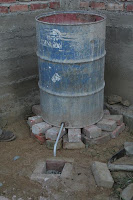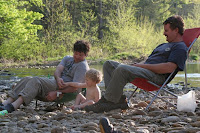Tom and I concocted a dynamite worm bin last weekend at his fam’s place. Our bosses presented us with a purchasable plastic worm bin fit with pipes, gaskets, and the works that our families could purchase for 100 Bs ($12, which is a lot for around here. To put it in perspective, Tom and I get $2 a day for living expenses outside of room and board –enough to buy furnishings, t.p., drinks, and the occasional dinner out). We constructed our worm bin for $0 out of scraps and bits we found around the yard: an old barrel, a piece of plastic sheeting, a discarded piece of pipe, and a broken squeegee we found under a pile of bricks.
 An old cylinder head from who knows whose car served as a punch to make a hole in the barrel for drainage. Once constructed, we added dirt, worms, and kitchen scraps. It should start producing its golden abono (Spanish: worm poop/fertilizer) in a few months. One worm, if fed right, will produce thousands of offspring within a year, and they’ll happily eat up all your kitchen scraps and turn it into wonder dirt for your garden.
An old cylinder head from who knows whose car served as a punch to make a hole in the barrel for drainage. Once constructed, we added dirt, worms, and kitchen scraps. It should start producing its golden abono (Spanish: worm poop/fertilizer) in a few months. One worm, if fed right, will produce thousands of offspring within a year, and they’ll happily eat up all your kitchen scraps and turn it into wonder dirt for your garden. 
We’ve also been learning to build eco outhouses. Building outhouses might sound a little outdated, but the norm here is to wander out back, find a patch of dirt, and do your thing. Well, that “thing” will eventually end up in the wrong place –your water source, your kitchen, your hands, your food- and cause all sorts of trouble. Bolivia has the highest infant mortality rate in Latin America because of poor sanitation. It’s ambitious to think we’ll be able to make a difference in two years, but a small change is still a change.
Figuring out how to build an ecologically friendly, waterless, inexpensive, user friendly, compact john is a learning process. We’re putting our thirteen heads together, along with the guidance of our stellar trainers, and are constructing an eco bathroom that should last half a century. The most important part of the process is involving the family, teaching them how to maintain it and, most crucially, helping them understand why using a bathroom is better than using the yard. There are NGO bathrooms all over the country being used as sheds and clubhouses because the families don’t understand the benefits of their god-given purpose. Education is our number one job.

Pouring the concrete for the base of the john. We forgot the rebar. Oops. We added it on top at the end. Might work.
Talking to the fam and playing games to teach them about using their new eco potty.











